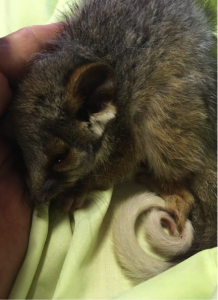
Climate Experience:
Citizens found numerous ringtail possums struggling to cope with persistent heatwaves. Two were found hanging in trees almost dead and 16 were admitted to the Kangaloola Wildlife Shelter.
Explanation:
- January temperatures were nearly 6 degrees above the long-term average.[1][2]
- The region has seen increasing periods of above average temperatures with 20 out of the last 21 years above the annual average.[3]
Ramifications:
- Victoria is expecting further temperature rises, that is there will be more extremely hot days[4]further pressuring wildlife survival.
What can be done?
- Email your local MP and tell them that action on climate is important to you and explain the impacts being felt in your area. One email might not feel like much but most politicians consider it to be representative of 100 citizens.
- Get involved with local groups taking action on climate, in this community look out for Wodonga Albury Towards Climate Health (WATCH) group.
- Help support the Act on Climate collective by donating; we are leading the charge for climate action. Your donation helps in advancing policies that prevent climate change from getting worse, we aim to empower communities and build a strong pro-climate-action constituency that governments can’t ignore, and as an added bonus it’s tax-deductable.
- Get involved with Act on Climate. We meet every Monday at 6pm (upstairs at 312 Smith St, Collingwood) and welcome all newcomers to join in the fight for climate justice. If you are unable to attend, follow us on Facebook, Twitter, and Instagram to keep up with the latest campaign.
* We aim to keep our material as accurate and as relevant as possible. Working with climate science, a field that is being constantly updated, keeps us on our toes. Information on this site was gathered on June 1 2019; if you notice information that needs updating please let us know. For the full reference list please see the following.
____________________________
[1]“Wodonga Climate”, Weather Zone, accessed April 23 2019, http://www.weatherzone.com.au/climate/station.jsp?lt=site&lc=82056
[2]“Albury-Wodonga January 2019 Daily Weather Observations”, Bureau of Meteorology, published April 17 2019, http://www.bom.gov.au/climate/dwo/201901/html/IDCJDW2002.201901.shtml
[3]“Australian Climate Change Site Data – Rutherglen”, Bureau of Meteorology, access April 23 2019, http://www.bom.gov.au/cgi-bin/climate/hqsites/site_data.cgi?variable=maxT&area=aus&station=082039&dtype=anom&period=annual&ave_yr=0
[4]CSIRO, “State of the Climate,” (Canberra: CSIRO & Bureau of Meteorology, 2018).22, http://www.bom.gov.au/state-of-the-climate/State-of-the-Climate-2018.pdf
